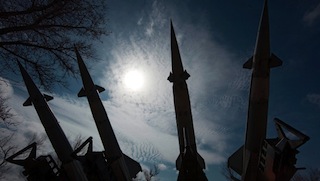Defense Experts Detail New Steps for Nuclear Security
Featured Image
Today's top nuclear policy stories, events, and analysis with excerpts in bullet form.
Stories we're following today - Wednesday, May 4, 2011:
Defense Experts Outline Next Steps for U.S.-Russian Nuclear Security - The Sustainable Partnership with Russia Group [link]
- The Sustainable Partnership with Russia Group, or SuPR Group, today launched a report with recommendations for the U.S. and Russia to continue working toward reductions in their nuclear stockpiles and to tackle top security challenges, including nuclear proliferation.
- The SuPR Group, a joint initiative of the Ploughshares Fund and the Center for Policy Studies in Russia (PIR Center) is comprised of leading American and Russian defense and security experts.
- In the report, the SuPR Group warns that failure to build on the success of New START could lead to a "cold pause" in U.S.-Russian relations, undermining the national security interests of both countries.
Congress Preparing Series of New Iran Sanctions Bills - Josh Rogin for "The Cable" a Foreign Policy Blog [link]
- The Obama administration and most of Washington may be focused on Libya or Pakistan, but several offices on Capitol Hill are preparing new sanctions bills to increase pressure on Iran.
- Sen. Mark Kirk (R-IL) will kick off the slew of new Iran sanctions legislation expected to be introduced in May on Wednesday, when he introduces a new bill to promote human rights and democracy in Iran. He is working on a bipartisan and bicameral basis with Sen. Kirsten Gillibrand (D-NY), Rep. Robert Dold (R-IL), and Rep. Ted Deutch (D-FL).
- Kirk's bill is only one piece of the larger puzzle of Iran bills circulating on Capitol Hill right now...the plan is to compile several Iran bills together into one massive, new Iran sanctions bill to be unveiled by the end of May.
Nuke-Free Zone Pacts Submitted to U.S. Senate - Global Security Newswire [link]
- President Obama on Monday submitted to the U.S. Senate for ratification the protocols to two treaties respectively banning from Africa and the South Pacific the presence, production, acquisition and use of nuclear weapons, the White House announced
- Ratification of the agreements would commit Washington not to employ or suggest it might employ nuclear armaments against states in areas covered by the pacts, provided those countries are Nuclear Nonproliferation Treaty signatories in compliance with their arms control commitments.
- The Obama administration intends in the future to move toward inking protocols for the Southeast Asian Nuclear Weapon-Free Zone and Central Asian Nuclear Weapon-Free Zone pacts by pursuing dialogue with states parties to each agreement, the White House said.
EVENT: "Playing the Nuclear Numbers Game: Strategic Stability and Deep Reductions"
- James Acton, Carnegie Endowment
- Wednesday, May 4, 2011, 12:30-2:00 p.m.
- George Washington University, Lindner Family Commons
- Room 602, 1957 E St., NW, Washington
- RSVP here
U.S. and Romania Move on Missile Plan - Thom Shanker and Ellen Barry for The New York Times [link]
- The United States and Romania announced an agreement on Tuesday on the location for basing American antimissile interceptors in Romania as part of a program designed to link Washington and its NATO allies against an Iranian threat.
- Russia immediately complained that the interceptors in Romania could undermine its nuclear deterrent, and said the step ignored commitments made by the United States that Russia would have a role in decision-making.
- American officials rejected the Russian complaints, and cited the invitation from the United States and NATO for Moscow’s participation in a common missile-defense system for Europe.
Surging Long-Term Costs Next Hurdle for F-35 - Frank Oliveri, CQ Staff for Congressional Quarterly [link]
- When Pentagon officials launched the F-35 Joint Strike Fighter program nearly a decade ago, they assured Capitol Hill the total price tag would be well shy of $1 trillion.
- But new projections show that the expected costs simply to operate and support the fighters will exceed $1 trillion — not even counting the additional almost $400 billion required to develop and build the planes.
- In December, the National Commission on Fiscal Responsibility and Reform recommended terminating the F-35B variant and substituting F-16s and F/A-18s for half of the Air Force and Navy purchases of F-35s. Lockheed Martin said, however, that its assembly line in Texas could produce only about four F-16s a month, according to the CRS.
EVENT: "Emerging Opportunities and Challenges of Global Security Engagement Programs" - May 11-12, 2011
- Conference at George Washington University
- Located at 1957 E St, NW (three blocks from the Department of State)
- RSVP to PublicOutreach@state.gov



